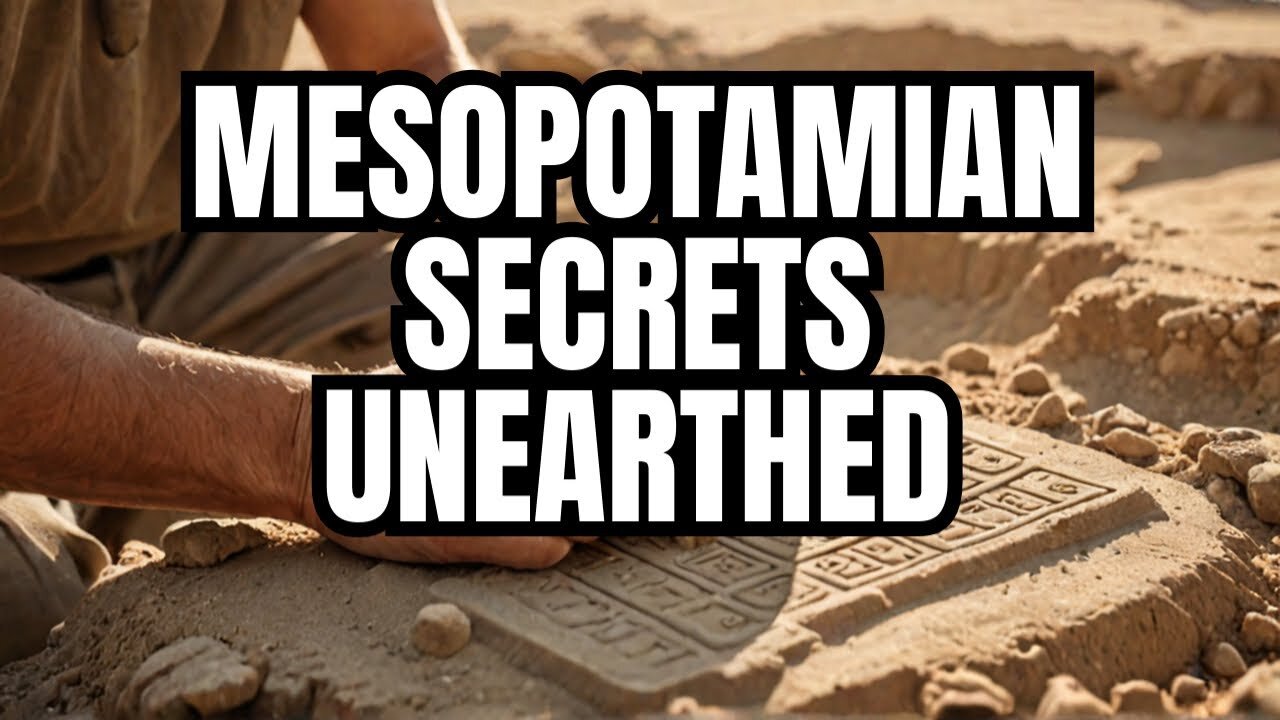Premium Only Content

The roots of Ancient Mesopotamia exposed!
Mesopotamia, often referred to as the cradle of civilization, holds a treasure trove of historical secrets waiting to be unearthed. From the majestic city of Babylon to the code of laws established by Hammurabi, the mysteries of this ancient civilization are as captivating as they are enlightening.
1. **Babylon: The Jewel of Mesopotamia**: Babylon was not only one of the most renowned cities of ancient Mesopotamia but also one of the most splendid in the entire ancient world. Its hanging gardens, one of the Seven Wonders of the Ancient World, have fascinated historians and archaeologists for centuries. While there is evidence of its existence, the exact location and layout of the gardens remain a subject of debate, adding an aura of mystery to this architectural marvel.
2. **The Code of Hammurabi**: Hammurabi, the sixth king of the First Babylonian Dynasty, is best known for his code of laws, one of the earliest and most complete written legal codes in history. This code, consisting of 282 laws, provides valuable insights into the social structure, justice system, and daily life of ancient Mesopotamia. However, the motivations behind some of the laws and their application in society raise intriguing questions about the culture and governance of the time.
3. **The Epic of Gilgamesh**: Often regarded as the earliest surviving great work of literature, the Epic of Gilgamesh offers a glimpse into the mythological beliefs and cultural values of ancient Mesopotamia. This epic poem tells the story of Gilgamesh, the legendary king of Uruk, and his quest for immortality. Beyond its narrative richness, the epic raises profound questions about mortality, friendship, and the human condition, resonating across millennia.
4. **Sumerian Civilization**: Before the rise of Babylon, the Sumerians established one of the world's earliest known civilizations in southern Mesopotamia. Their innovations in writing, architecture, and governance laid the foundation for many aspects of later Mesopotamian culture. Yet, despite their significant contributions, much about Sumerian society and its origins remains shrouded in mystery, inviting further exploration and research.
5. **Religious Beliefs and Rituals**: Religion played a central role in the lives of ancient Mesopotamians, influencing everything from politics to agriculture. Deities such as Marduk, Ishtar, and Enki held sway over various aspects of existence, and elaborate rituals and ceremonies were conducted to appease them. Delving into the intricacies of Mesopotamian religious practices can provide valuable insights into the spiritual worldview of this ancient civilization.
6. **Trade and Commerce**: Mesopotamia's strategic location between the Tigris and Euphrates rivers made it a hub of trade and commerce in the ancient world. The city-states of Mesopotamia engaged in extensive commercial activities, exchanging goods such as grains, textiles, and precious metals with neighboring regions. Exploring the economic dynamics of ancient Mesopotamia can illuminate the interconnectedness of civilizations in antiquity.
By unraveling these and other mysteries, we can deepen our understanding of the rich tapestry of Mesopotamian civilization and appreciate its enduring legacy in shaping the course of human history.
-
 LIVE
LIVE
FyrBorne
2 hours ago🔴Warzone M&K Sniping: Sharp Minds Cut Deeper Than Dull Swords
85 watching -
 18:27
18:27
Machete Gaming
1 day ago $1.00 earnedThe FIFA Everyone Hated… But It BLEW My Mind
9.68K1 -
 39:53
39:53
pewculture
1 day agoThe Pew Culture Podcast #22 - MILE 22
909 -
 1:45:44
1:45:44
Tommy's Podcast
19 hours agoEpstein | E.M. Burlingame & John Cullen (TPC #1,782)
4.7K10 -
 LIVE
LIVE
Cewpins
11 hours agoStoned Gamer🔥Tony Hawk's Pro Skater 3 & 4💨420 !mj🍃!Giveaway
61 watching -
 7:48
7:48
The Official Steve Harvey
18 hours ago $1.01 earnedStop Waiting on the Right Time: Have Faith and Use Your Gift
16.2K5 -
 6:23
6:23
DropItLikeItsScott
16 hours ago $1.10 earnedTISAS B9R Double Stack / The BEST 1911 9mm??
11K2 -
 11:22
11:22
NikkoOrtiz
17 hours agoUnhinged Dark Memes
18.5K5 -
 49:10
49:10
Michael Knowles
20 hours agoBREAKING: 82 People Dead As Libs Blame Trump For Texas Flood | Ep. 1765
21.5K30 -
 1:13:01
1:13:01
SinCityCrypto
20 hours ago $0.91 earnedBitcoin Rallies as Trump Extends Tariff Pause
14.3K1